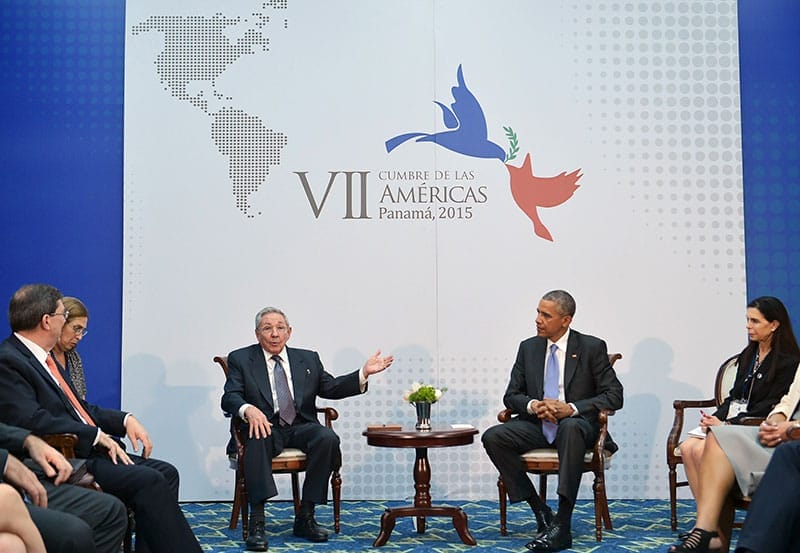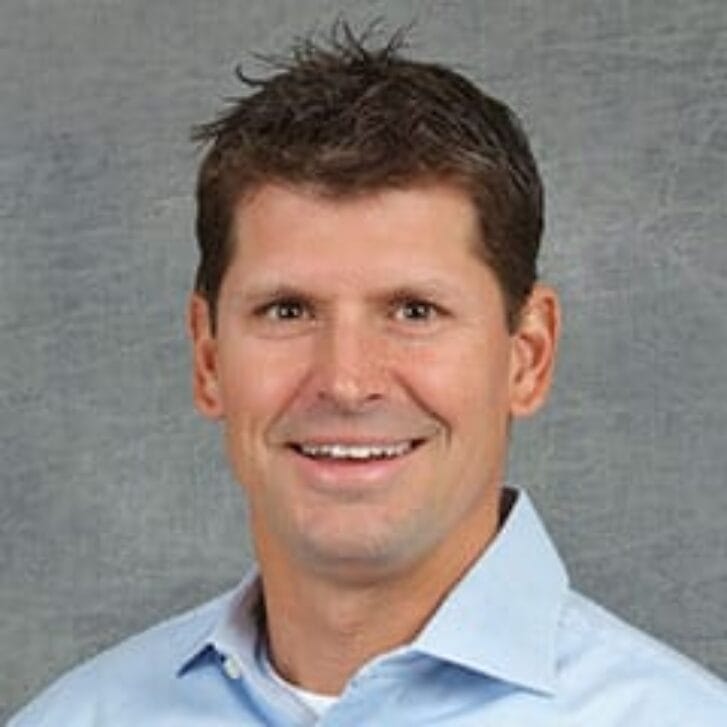It may be a bit of an exaggeration to say that Wharton alumni helped to bring President Barack Obama and President Raul Castro together at a historic summit. However, it’s not a stretch to say that an alumnus helped arrange for the Israeli prime minister to address Congress in a historic, and some would say controversial, speech.
The former story began for Emanuel Gonzalez-Revilla W88 nearly nine months ago when he took over as Panama’s ambassador to the United States. The administration of Panama’s new President Juan Carlos Varela had just inherited the job of hosting the Summit of the Americas, a series of meetings held in April with the Western Hemisphere’s heads of state. The most intriguing detail—Cuba’s attendance—got even more interesting on Dec. 17, 2014, when Obama announced normalization of relations with that island nation.
“Once it was announced that both the U.S. and Cuba we going to be there, the Summit became a truly historic event,” says Gonzalez-Revilla.
This past April 10 and 11, the Seventh Summit of the Americas became the first time that representatives from Cuba and the U.S. had been together at a regional summit since 1956.
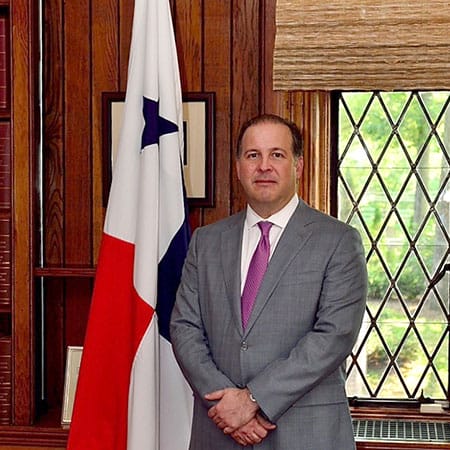
Panama Ambassador Emanuel Gonzales Revilla says of his role: “People really have to realize that we’re ambassadors; we don’t set policy. We’re basically soldiers, and we represent our countries and our countries’ interest.”
“This was a very historic summit because it was the first time that President Obama and President Raul Castro from Cuba met face to face and shook hands and started to work out the differences between the United States and Cuba,” says Roman Macaya WG98.
A Wharton alumnus and, yes, an ambassador, Macaya had the honor of attending the summit as a representative of Costa Rica. In fact, due to a series of meetings that took the president, the minister of foreign affairs and the ambassador to the OAS, he was sitting at the summit table— the only one at the table not a president. Obama addressed the meeting first, explaining how he preferred to focus on issues going forward and not to fight battles that started before he was born. Castro, “who took some leeway with the length of his speech,” Macaya recalls, detailed those historical battles, but then closed by saying he separated the policies from the president and that Obama was a good man with whom Cuba could talk and negotiate.
“Sitting next to Raul Castro, while he was speaking, just after President Obama spoke, in the thawing of this relic of the Cold War that took 56 years … I had a front-row seat to history,” Macaya says.
Gonzalez-Revilla devoted his first seven months as ambassador to making sure that summit was a success, that that moment could take place. Though he is quick to note he carried out a “small role” among a “huge undertaking that many, many people were involved in.”
FULL PLATES
As for our other story laden with geopolitical gravitas, Ron Dermer W93, Israeli’s Ambassador to the U.S., no doubt has one of the most intense ambassadorships in the District of Columbia.
“Israel is not in a normal region. We are a very unique country in a unique region at a unique time,” Dermer says. “We still face threats to our very existence.”
As with other ambassadors, Dermer’s primary role is to advance the interests of the state of Israel, the No. 1 directive being to strengthen the relationship with its top ally, the U.S. Though the Israeli government may have differences of opinion with the Obama administration, and the media may harp on those differences, “on the big issues, on the most important thing, we’ll be in the same place,” Dermer explains. His job is to ensure that remains the case.
Speaking of the media, Dermer’s job—unlike that of most other ambassador’s—is to be a fixture on not just Israel’s media but America’s. He is called into studios to make the case for his country’s position, on a weekly basis by his estimate. During the war in Gaza last summer, he had to “run from studio to studio defending Israel.”
And sometimes he needs to facilitate his boss’s appearances. Such was the case when Dermer helped to arrange for Prime Minister Binyamin Netanyahu to address the U.S. Congress on March 3, 2015, announcing Israel’s view of the delicate negotiations taking place between Iran and the Obama administration.
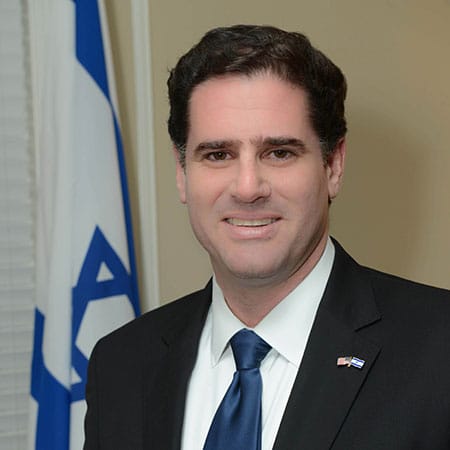
What Israeli Ambassador Ron Dermer points business leaders to: Israel’s enormous capacity for innovation and the dynamism of its workforce. Despite its geographical size, it is world-class in high-tech, cybersecurity and water technology.
Not all of Wharton’s ambassadors in Washington help to ignite an international firestorm—as Netanyahu’s congressional address did—nor do they work for a country that faces existential threats or routinely engages in wars and skirmishes with its neighbors. Yet our other ambassadors’ work is crucial to their respective nations.
Besides a “core nucleus” of foreign policy priorities like human rights and democracy, Costa Rican Ambassador Macaya promotes the “pragmatic goals” of facilitating trade, promoting foreign direct investment in his country, and encouraging the exchange of students, for instance. Macaya is a Ph.D. trained scientist who worked in the pharmaceutical business in the U.S. before returning to Costa Rica in 1998, so one of his main priorities lies with promoting science and technology through diplomacy. During any week of office, you might find him meeting with the American Association for the Advancement of Science about participating in a forum, or exploring the use of satellite technology to monitor natural catastrophes with NASA, or visiting with universities to promote the exchange of researchers.
Macaya realizes his good fortune in serving a nation with strong bonds with the U.S. on the basis of shared values.
“That is very fortunate because I spend most of my time working on opportunities rather than on putting out fires,” he says.
After the success of the Summit of the Americas, Gonzalez-Revilla’s priorities have pivoted to another of his president’s, which is education. President Varela has declared the goal of training 10,000 Panamanian teachers to instruct students in both Spanish and English, and to this end, Gonzalez-Revilla has facilitated partnerships with U.S. educational facilities—Penn being one.
“Education is such a critical part of the whole development of the region,” he says. “You can create opportunities with economic growth, but you have to make sure your labor force is educated and trained to actually access those opportunities.”
Opportunities abound for Jose Cuisia Jr. WG70, the Philippines’ ambassador, whose main priority is “economic diplomacy.” He hopes to further bilateral trade, which has grown from $13 billion in his first year (2011) to around $24 billion. It’s in part because the Filipino economy is strong and the current administration publicly dedicated to trustworthy governance. Trade isn’t the only goal; his government aims to attract more American businesses into public-private infrastructure projects.
Cuisia’s nation also stares down serious man-made and natural threats. It combats terrorist extremists and secessionists, and it is frequently battered by storms, such as Typhoon Haiyan in November 2013, which killed more than 6,000 and left 4 million homeless. Then, Cuisia helped bring together 33 Filipino nonprofit organizations to throw an “After the Storm” benefit concert.
“At the beginning, they said, ‘Ambassador, that’s impossible, you can’t get the Filipino organizations here to work together; they are always competing,’” Cuisia recalls.
Together, the nonprofits ended up raising more than $600,000 and creating a permanent joint organization called the Filipino Humanitarian Coalition.
The Philippines is also involved in the international crisis in the South China Sea involving China and disputes over territory. As Cuisia explains it, China is reclaiming land within the Philippines’ exclusive economic zone, which he says imperils the freedom of navigation and is a concern to all nations bordering the South China Sea.
“Every opportunity I get, I speak about it,” Cuisia says, about an outreach approach reminiscent of Dermer’s.
[well]
Adding up Ambassadors
Penn overall has six ambassadors in Washington. Including the four we’ve interviewed, there are Roy Ferguson G73 (New Zealand) and Awang Adek Hussin G79 GR84 (Malaysia). By our count, only Johns Hopkins has more ambassadors in Washington (seven). Close are Georgetown (five) and University of Hawaii (four).
[/well]
BUSINESS HELPS WITH BEING HEARD
Dermer has no trouble being heard in the District, but for other ambassadors, one must imagine the capital to be like trying to win a shouting match in a nursery full of screaming infants. How do they get heard among the other nations, the heads of state, the congressmen and women and bureaucrats, and the countless lobbyists? That brings us to the coincidence that Wharton boasts four ambassadors in Washington. Yes, is it even a coincidence? No, having a business background is very helpful for ambassadors, and many ambassadors come from business backgrounds.
Business savvy is valuable in helping to position a nation in a crowded “market.” Macaya knows how to promote Costa Rica in niche areas where it’s especially attractive, for instance, like sustainability. Costa Rica will finish 2015 with about 97 percent of its electricity from renewable sources, he boasts, and it aims to be totally carbon neutral in six years.
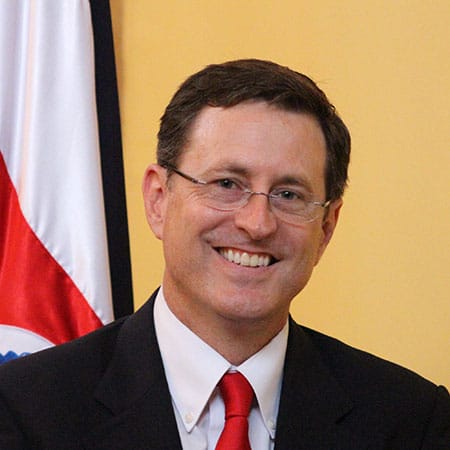
Costa Rican Ambassador Roman Macaya’s favorite ambassadorial moment: Presenting his credentials to President Obama on Sept. 18, 2014, along with his wife, four children and parents. “The Macayas invaded the Oval Office,” laughs Macaya.
Successful businesspeople know how to build relationships to spread the word out and get deals done.
“It’s really getting to know the landscape, working the maze, because it is a maze, and developing the personal relationships and being consistent,” Macaya says.
It’s also about fluency in the language of commerce and finance. U.S. business leaders frequently call on Cuisia, a serial CEO (most recently of American International Group Inc. subsidiary Philippine American Life & General Insurance) who has established regular meetings with the U.S. Chamber of Commerce and the U.S. ASEAN Business Council, among other groups. About these business groups and individual commercial leaders, he says:
“I understand their concerns and they feel comfortable bringing [them to me] because they know they don’t have to explain every little detail.”
Then again, being accustomed to serving as a company executive can create complications in a diplomatic setting. New to the diplomatic corps, both Gonzalez-Revilla and Macaya chuckle about how they have carried out their responsibilities and contact with a more direct approach than most ambassadors are expected to wield.
“When I was first appointed ambassador to the U.S., my friends were laughing, ‘You, a diplomat?’ You know, I have been known for many things, but not being diplomatic,” says Gonzalez-Revilla.
Still, Gonzalez-Revilla is a well-trained relationship builder. “I’m hitting the pavement every day,” he says.
It’s a skill he honed at Penn. He comes from a very big Penn family tree. His father told him when he started at Penn, “You know, I don’t care about the grades you get, just make sure you meet as many people as you can and keep in touch with them.”
HIGHER PURPOSE
Skeptics sometimes wonder if all ambassadors are merely well-connected individuals on a vacation of privilege to a foreign land, but to be fair to ambassadors themselves, they are often removing themselves from busy lives and powerful careers—think of the opportunity costs—all in the name of public service.
Being an ambassador, too, isn’t often their first choice for public service.
“My freshman year at Wharton, if you told me I would be Israel’s ambassadors to the U.S., I would think you crazy,” Dermer says.
While the Miami-born and -bred Dermer studied Finance and Management at Penn, he dreamed of being an entrepreneur, even became one—launching two businesses while in school, a study guide operation and a Time Out-like magazine. But he grew up in a family where public service was seen as the “highest calling.” His dad was mayor of Miami Beach; his brother became mayor in the same community.
So it isn’t a total surprise when a job at a think tank in Washington after graduation went from being a detour to a career path. He ended up at Oxford for a graduate degree and worked for Natan Sharansky, who was building the Israeli political party Yisrael BaAliyah, in large part to represent Russian emigres to Israel. Dermer became chief strategist for the party in the mid-’90s at a time of confluence: the Oslo peace process was beginning, secular religious issues heated up, the high-tech industry was blossoming. Israel drew him in.
“I was hoping that I could do whatever I could to serve Israel,” he says.
Just like Dermer, the other Wharton ambassadors are not new to public service. Macaya in Costa Rica attempted to serve his nation in its highest office, having “plunged head first,” as he put it, into a primary presidential campaign in 2009. Macaya was not successful and ruled out another run in the 2014 election, but he did tell current president, Luis Guillermo Solís, before his election that he would gladly help. Part time, he cautioned, but help in any way. Macaya envisioned a board of directors position at a public entity, something that would allow him to participate in the private sector yet continue to run his family’s business.
When Solís became president-elect, he called Macaya on that offer, but requested full-time service: the ambassadorship.
“It really caught me off guard. He caught me so much off guard that I couldn’t answer,” Macaya remembers.
Four days later, he called the president back to tell him he would be honored to represent his country.

Philippines Ambassador Jose Cuisia’s approach to leadership: “One is that I listen to people … Within my team, my management team, I encourage them to speak out because I recognize that I don’t have a monopoly of knowledge.”
Philippines
Cuisia served his nation twice before, first as head of the Social Security System, which he basically resuscitated after the People Power overthrow of the Marcos regime in February 1986, then as the governor of the Central Bank, which he basically had to recreate and free from Marcos-related debt through the legislative process. Compared with his previous two assignments, during which he was worried about the balance sheet of the nation, Cuisia’s current job doesn’t bear the responsibility of systemic risks and the life of the nation.
Gonzalez-Revilla also served previously, 10 years ago as the chair of the Panama Pacifico Economic Area, a region of economic redevelopment created when Howard Air Force base was handed over to Panama.
Then when Panama’s President Varela—with whom Gonzalez-Revilla used to ride the bus to school as a child—was running for the office, he told Gonzalez-Revilla, “If I win, you’re going to D.C.”
“When the president says, ‘You’re doing something,’ it is very difficult to say no,” Gonzalez-Revilla explains.
Yet personal relationships aside, Gonzalez-Revilla also testifies to a “moral obligation” he feels to a country that has afforded him great business success.
“It’s important that people from the private sector get involved, not necessarily in politics, but in government. And that’s a way of just giving back to the country that has been so good to us,” he says.
By representing their nations well in what is arguably the international capital—not to mention helping to resolve 50-year diplomatic ruptures between Cuba and the U.S. and seeking long-term solutions to preserving peace in the Middle East, our Wharton ambassadors are giving back to the world. And they are doing so in each other’s company. The ambassadors most recently met up at a Wharton Club of DC event. Obama, Castro and Netanyahu were not in attendance, however.




















